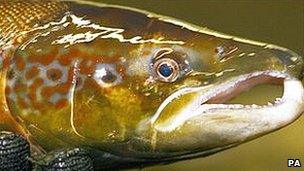Salmon can 'sniff out' predators - Swansea uni research
- Published

Salmon can sense mammal predators because they can tell whether they have eaten salmon before, according to new research.
Swansea University scientists found the fish can "sniff out" otters and other common predators.
Smell acts as an early warning system for the fish.
"It's the predator's diet - not just its own smell - that's alerting the salmon," said Dr Laura Roberts, co-author of the scientific report.
Although previous studies have shown that some fish can detect the presence of other predatory fish, this is the first research to show that fish can also sense mammal attackers.
Y-maze chamber
The researchers tested individual Atlantic salmon in a "Y-maze chamber" - a trough with two arms linked to a holding tank at one end.
Different scents were released into each arm of the tank - one scented by otters which had eaten salmon and the other with the scent of non-salmon-eating otters.
The salmon's avoidance behaviour was measured by recording how much time they spent in different parts of the tank.
They found the fish tended to avoid the water which had been scented by otters which had eaten salmon - around 85% of the time - but did not avoid water scented by non-salmon-eating otters.
"We wanted to test whether the salmon were able to recognise the otter as a threat using just chemical cues, and also to see whether they were detecting the smell of the predator's itself or of its diet," said Dr Roberts, whose research was published in the Animal Behaviour Journal.
"The salmon's ability to sense these chemicals helps them react to a wide range of predators without the need to learn about each individual species."
- Published16 August 2010